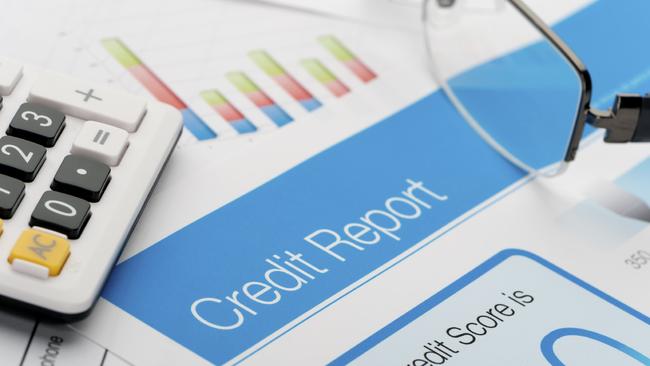Banks have more credit information on you than ever before, experts warn
Banks have more information on Aussies than ever before, and a solid credit score is now essential for those applying for loans. This is what your number should look like.
Banks have access to a fatter dossier on you than ever before, making it critical for every Australian to keep their finances in check.
Credit reports and credit scores are something many people pay little attention to but experts warn this could end up biting them hard when they go to access finance.
Both good and bad information is now stored on consumers’ files, allowing lenders to know if you are good at paying your bills or have a checkered financial past.
Marketplace lender MoneyPlace’s chief executive officer, Stuart Stoyan, warned Australians to pay attention to their personal finances.
“It’s absolutely something you should care about,” he said.
“Through credit bureaus, lenders can get more information on you than they have been able to get before.”
MORE NEWS:
Australia’s new US data deal to fight terror
Shock twist in ex-Sydney private schoolboy’s case
Aussie kids’ new playtime rule
The black marks that impact your credit file
WHAT’S ON YOUR FILE?
Both positive and negative information, so the good and the bad.
It has all your personal information including name, gender, date of birth, driver’s licence and employer details.
And it includes the type of credit accounts you have including mortgages, home loans, personal loans, and utility and telco bills information.
Other forms of credit, including buy now pay later schemes, are tipped to soon appear on credit files, experts say.
Files also delve into a customer’s limits, they name the credit providers and list the dates accounts were opened and closed.

Mr Stoyan said the most important thing listed on a person’s credit file was their repayment history.
“If you have taken out a loan, what is now on your credit file is the past 24 months of your repayment history,” he said.
“It shows whether or not you are making your repayments on time and if you are missing a repayment and how many repayments have you missed.”
Mr Stoyan said this mass of important information helped lenders get your full financial picture before assessing you for a new loan.
Borrowers should also be mindful that every time they make an application for credit it ends up on their file.
A lender may err on the side of caution if they see repetitive applications made, regardless
of whether or not they are taken up. As for defaults, they hurt a lot.
They can be recorded on your file if they are $150 or more and more than 60 days overdue.
It will also bring down your credit score.
RECENT CHANGES
Creditsimple.com.au chief executive officer David Scognamiglio said there were now millions more pieces of information available on Australians’ credit files since the introduction of comprehensive reporting.
Just last month three of the big four banks — ANZ, the Commonwealth and Westpac — followed in the footsteps of National Australia Bank in sharing their customers’ mortgage information with credit reporting bodies (CRBs).
Mr Scognamiglio said this was critical to understanding a customer’s financial status quo.
“It’s data about you and it’s part of what’s used in the lending process and judged on whether or not you are going to get a loan,” he said.
“And each bank is adding payment data every month so if you miss a credit card payment, that’s going to be recorded and impact your score.”
The Australian Retail Credit Association’s chief executive officer, Mike Laing, said there were 32 credit providers feeding their credit accounts into the CRBs which “accounts for about 90 per cent of all credit accounts”.
“Many of those have only put some of their credit accounts in: there’s an industry agreement when you first start sharing information you put half in and within 12 months you have to put the second half — it’s a major project,” he said.
“That’s why lenders put credit cards in first 12 months ago and at the anniversary of that they put the rest in.”

CREDIT SCORES
Credit scores are usually between zero and 1000 or zero and 1200, depending on which credit score service you use.
Experts warn banks are unlikely to lend to someone with a score under 650.
There are three main CRBs in Australia which all provide your credit score for free and
are linked to different websites. These are Equifax (getcreditscore.com.au), Experian (creditsavvy.com.au) and illion (creditsimple.com.au).
Consumers can also sign up to free alerts that can update consumers when something
on their credit file has changed, but be mindful they also offer credit products.
You can pay an annual fee to access your credit file anytime.
ERRORS
It’s not uncommon for errors to pop up on your credit file and this could have a detrimental impact on you.
Mr Scognamiglio said this highlighted why it was so important to check your credit file regularly.
“If you think there’s something inaccurate on it, there’s always people who dispute a record on their file and a large amount of people can get it remediated or removed,” he said.
“They may have a default against them that’s on their credit file that’s not theirs and you can dispute it.
“The reason you want it taken off is a major bank won’t give you a loan if you have a default there.”
Experts suggest contacting your lender about the issue on your file, but customers should steer clear of services charging hefty fees, often starting from
at least $1000, to have black marks removed.
CREDIT SCORES
0-549 — Below average
550-624 — Okay
625-699 — Good
700-799 — Very good
800 — 1000 — Excellent
* Most scores are between 300 and 850.
* Average female score is 796 and average men 778.
Source: Creditsimple.com.au
